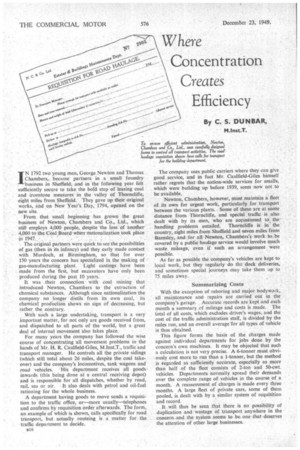Where
Page 50

If you've noticed an error in this article please click here to report it so we can fix it.
Concentration Creates Efficiency
By C. S. DUNBAR, minst.T.
IN 1792 two young men, George Newton and Thomas Chambers, became partners in a small foundry business in Sheffield, and in the following year felt sufficiently secure to take the bold step of leasing coal and ironstone measures in the valley of Thorncliffe, eight miles from •Sheffield. They gave up their original works, and on New Year's Day, 1794, opened on the new site.
From that small beginning has grown the great business of Newton, Chambers and Co., Ltd., which still employs 4,000 people, despite the loss of another 4,000 to the Coal Board when nationalization took place in 1947., . ._ • The original partners were quick to see the possibilities of gas (then in its infancy) and they early made contact with Murdoch, at Birmingham, so that for over 150 years the concern has specialized in the making of gas-manufacturing plant. Light castings have been made from the first, but excavators have only been produced during the past 10 years.
It was their connection with coal mining that introduced Newton, Chambers to the extraction of chemical substances. Although since nationalization the company no longer distils from its own coal, its chemical production shows no sign of decreasing, but rather the contrary.
With such a large undertaking, transport is a very important matter, for not only are goods received from, and -dispatched to all parts of the world, but a great deal of internal movement also takes place.
For many years the company has followed the wise course of concentrating all movement problems in the hands of Mr. H. R. Caulfield-Giles, M.Inst.T., traffic and transport manager. He controls all the private sidings (which still total about 26 miles, despite the coal takeover) and the company's locomotives, tank wagons and road vehicles. His department receives all goods• inwards (this being done at a central receiving depot) and is responsible for all dispatches, whether by road, rail, sea or air. It also deals with petrol and oil-fuel rationing for the whole business.
A department having goods to move sends a requisition to the traffic office, or—more usually—telephones and confirms by requisition order afterwards. The form, an example of which is shown, calls specifically for road transport, but actually routeing is a matter for the traffic department to decide. The company uses public carriers where they can give good service, and in fact Mr. Caulfield-Giles himself rather regrets that the nation-wide services for smalls, which were building up before 1939, seem now not to be available.
Newton, Chambers, however, must maintain a fleet of its own for urgent work, particularly for transport between the various plants.. Some of these are at some distance from Thorricliffe, and special traffic is also dealt with by its men, who are accustomed to the handling problems entailed. Thorncliffe is in the country, eight miles from Sheffield and seven miles from Barnsley, and for all Newton, Chambers's work to be covered by a public haulage service would involve much waste mileage, even if such an arrangement were possible.
As far as possible the company's vehicles are kept to local work, but they regularly do the dock deliveries, and sometimes special journeys may take them up to 75 miles away.
Summarizing Costs With the exception of reboring and major bodywork, all maintenance and repairs are carried out in the company's garage. Accurate records arc kept and each month a summary cf mileage and costs is made. The total of all costs, which excludes driver's wages, and the cost of the traffic administration staff, is divided by the miles run, and an overall average -for all types of vehicle is thus obtained,
This figure forms the basis of the charges made against individual departments for jobs done by the concern's own machines. It may be objected that such a calculation is not very precise. A 6-tonner must obviously cost more to run than a 1-tonner, but the method is regarded as sufficiently accurate, especially as more than half of the fleet consists of 2-ton and 50-cwt. vehicles. Departments normally spread their demands over the complete range of vehicles in the course of a month. A reassessment of charges is made every three months. A large fleet of private cars, some of them pooled, is dealt with by a similar system of requisition and record.
It will thus be seen that there is no possibility of duplication and wastage of transport anywhere in the concern .and the system seems to be one that •deserves the attention of other large businesses.




















































































